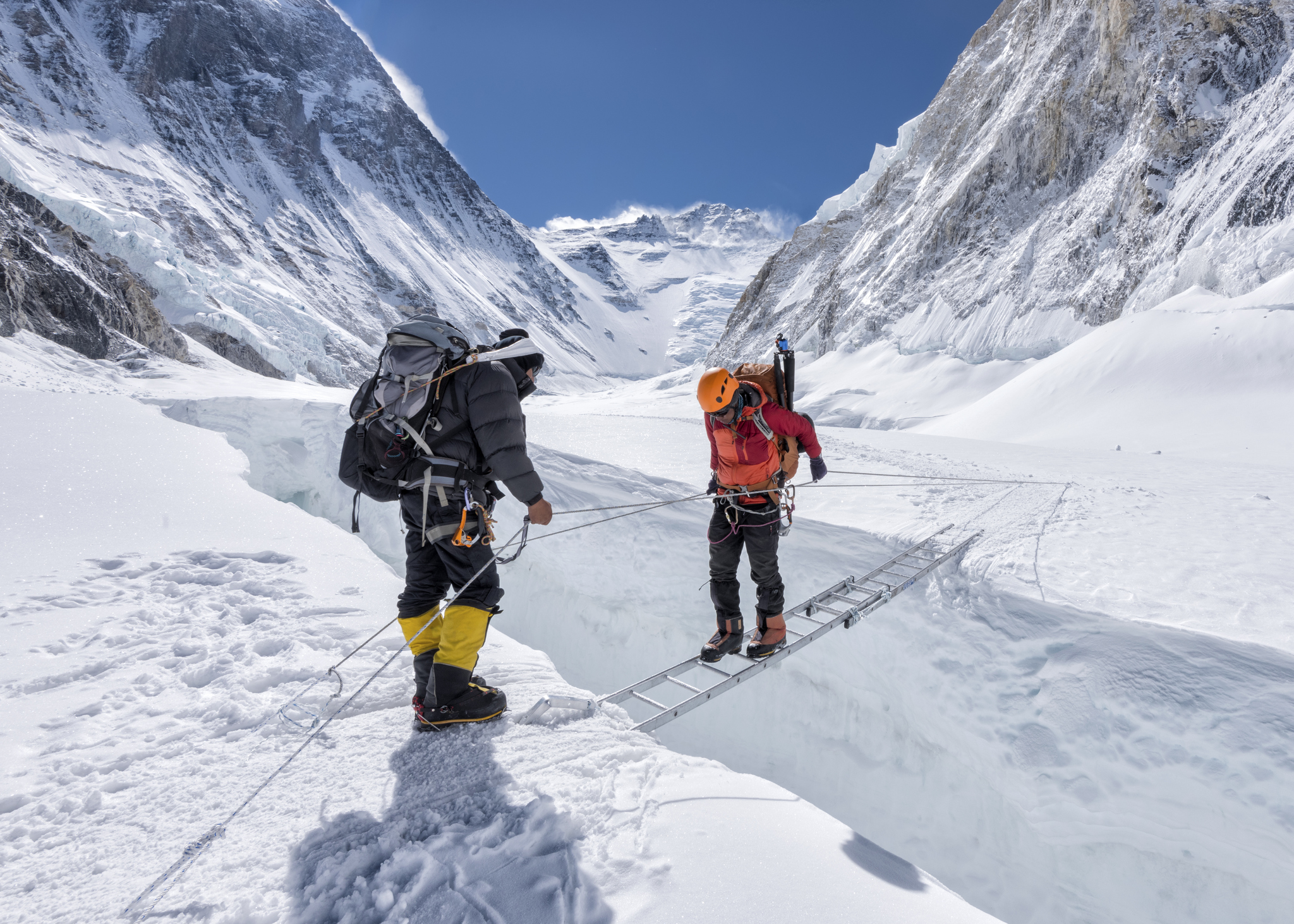Thrill seeker? Try adventure tourism.
Travelers are rocketing into space, plumbing the ocean’s depths, and risking their lives in the pursuit of thrills

A free daily email with the biggest news stories of the day – and the best features from TheWeek.com
You are now subscribed
Your newsletter sign-up was successful
Adventure tourists are rocketing into space, plumbing the ocean's depths, and risking their lives in the pursuit of thrills. Here's everything you need to know:
What is "extreme tourism"?
Wealthy adventurers are paying huge sums to scale the world's highest peaks, trek to the poles, descend to the ocean's depths, and seek out some of the most remote and dangerous spots on Earth. This phenomenon was recently spotlighted when five men — including three adventure tourists who'd paid $250,000 apiece — died on a submersible, the Titan, which imploded as it descended to the wreckage of the Titanic, 2.4 miles deep in the Atlantic Ocean. One of the tourists, British billionaire Hamish Harding, had previously visited the South Pole and flown to the edge of space. Adventurers who pay for these trips are driven to "constantly push the boundaries of their travels to chase thrills and claim bragging rights," said Peter Anderson of the global concierge firm Knightsbridge Circle. Unsatisfied by vacation journeys to Paris or the Pyramids, they "seek out more unique experiences, many of which involve a degree of risk," Anderson said.
Why is this industry growing?
One factor is the pandemic, which lit a fire under some people to seize the day. "People are definitely going after the bucket-list experiences," said Dan Richards, the CEO of Boston-based Global Rescue, which assists travelers in emergency situations. Extreme tourism is also a by-product of a concentration of massive wealth among entrepreneurs and investors who are looking for other challenges to overcome. These are "very focused, affluent, goal-driven people" who "want to be the most elite," said Eric Larsen, who offers guided trips to the North and South poles that start at $50,000. Extreme tourism is also driven by technology, which is increasing accessibility to the most remote frontiers — including space.
The Week
Escape your echo chamber. Get the facts behind the news, plus analysis from multiple perspectives.

Sign up for The Week's Free Newsletters
From our morning news briefing to a weekly Good News Newsletter, get the best of The Week delivered directly to your inbox.
From our morning news briefing to a weekly Good News Newsletter, get the best of The Week delivered directly to your inbox.
Who's going to space?
Three billionaire-led space-travel companies — Richard Branson's Virgin Galactic, Jeff Bezos' Blue Origin, and Elon Musk's SpaceX — are gearing up to send wealthy adventurers into orbit, and the financial-services firm UBS predicts that the space travel market will be worth $3 billion by 2030. Last month, Virgin Galactic flew its first 90-minute commercial flight to the edge of space, 55 miles above Earth. It hopes to eventually send up 400 flights a year, with customers paying $450,000 to experience a few minutes of weightlessness and gaze down on Earth; some 800 have reserved seats. Since 2021, Blue Origin has sent 31 passengers on an 11-minute, 62-mile rocket journey for an undisclosed fee, while in April Musk's SpaceX ferried three civilians, who paid an estimated $55 million apiece, to spend eight days on the International Space Station. A California-based company hopes to open a space hotel, the Voyager Station, by 2030, that will include villas, a gym, and a restaurant and bar, as well as artificial gravity created by its rotation.
What other destinations are popular?
Some venture to the ocean's depths. OceanGate, which operated the Titan, has suspended all operations, but a company called EYOS Expeditions charges $750,000 a person to bring adventurers in a titanium-hulled Triton submersible to the Mariana Trench, which at 36,000 feet is the deepest spot in the ocean. Other adventurers travel literally to the ends of Earth: the North and South poles. Antarctic travel in particular has seen a boom, with more than 105,000 visitors last year to a region that decades ago saw only a few hundred visitors a year. A five-day, 69-mile ski trip to the South Pole runs $75,000; visitors can also take a private jet to White Desert, which for $15,000 a night offers luxury sleeping domes, gourmet dining, a yoga pod, and a sauna. Other extreme tourists are scaling mountain peaks, including Mount Everest — a fad not everyone is thrilled about.
Why not?
A record 463 climbing permits were issued at the world's tallest mountain during the spring climbing season — and a record 17 deaths followed. Veterans complain about inexperienced adventurers creating "traffic jams," garbage, and human waste on the trails, and requiring costly rescues. Other extreme journeys run a wide gamut: subsistence fishing on desert islands in the South Pacific, dog sledding in Alaska, heli-skiing in the Himalayas.
Are there downsides to extreme tourism?
Space trips put a lot of ozone-depleting pollutants into the atmosphere, while conservationists are sounding the alarm about the degrading impacts of the throngs headed for Antarctica. The Titan debacle highlighted another issue: the need for costly, sometimes risky rescue operations when things go awry. "It's a fair question to ask, whether or not governments should be in the business of saving people from themselves," said Richards of Global Rescue. One might think the Titan's grisly fate would dull the hunger for extreme experiences, but industry experts say the opposite is often true. Philippe Brown of the London-based agency Brown and Hudson reported a "marked increase" in queries about extreme travel after the Titan. Instead of deterring people, "tragedies sometimes generate interest," he said. More danger, it seems, produces more thrills worth paying for.
A free daily email with the biggest news stories of the day – and the best features from TheWeek.com
The lure of mortal risk
When a volcano erupted on White Island near New Zealand in 2019, killing 22, a local guide reported a curious phenomenon: a bump in queries from adventurers wanting to visit the island. When five climbers died in 2021 on the Himalayan mountain K2, interest from climbers actually grew. Austrian mountain guide Lukas Furtenbach has seen such spikes in interest after deadly seasons at Mount Everest. "Part of the appeal is risk," he said. "As long as people die in these places, it's part of the reason people want to go there." For some extreme adventurers, mortal danger may exert its pull only in the depths of their unconscious; for others it's front of mind. British entrepreneur Jules Mountain says he discarded a plan to trek to the North Pole because "it didn't feel dangerous enough." Instead, he opted for a solo helicopter voyage across the Atlantic, requiring risky stops for fuel in the frozen reaches of Greenland and Iceland. Engine failure would likely have meant death, he said. "And that's when the adrenaline rush hits — it's when you feel most alive."
This article was first published in the latest issue of The Week magazine. If you want to read more like it, you can try six risk-free issues of the magazine here.
-
 How the FCC’s ‘equal time’ rule works
How the FCC’s ‘equal time’ rule worksIn the Spotlight The law is at the heart of the Colbert-CBS conflict
-
 What is the endgame in the DHS shutdown?
What is the endgame in the DHS shutdown?Today’s Big Question Democrats want to rein in ICE’s immigration crackdown
-
 ‘Poor time management isn’t just an inconvenience’
‘Poor time management isn’t just an inconvenience’Instant Opinion Opinion, comment and editorials of the day
-
 The video game franchises with the best lore
The video game franchises with the best loreThe Week Recommends The developers behind these games used their keen attention to detail and expert storytelling abilities to create entire universes
-
 The buzziest movies from the 2023 Venice Film Festival
The buzziest movies from the 2023 Venice Film FestivalSpeed Read Which would-be Oscar contenders got a boost?
-
 America's troubling school bus driver shortage
America's troubling school bus driver shortageSpeed Read Kids are heading back to school, but they might be having trouble getting a ride
-
 5 college admissions trends to watch out for this year
5 college admissions trends to watch out for this yearSpeed Read College advisers and admissions experts say these trends will shape the 2023-2024 admissions cycle
-
 What's going on with Fyre Festival II?
What's going on with Fyre Festival II?Speed Read Convicted felon Billy McFarland claims the music festival will happen, for real this time
-
 The answer to rising home prices: smaller homes
The answer to rising home prices: smaller homesSpeed Read Builders are opting for fewer rooms and more attached styles as frustrated homebuyers look for affordable options
-
 5 illuminating books about the video game industry
5 illuminating books about the video game industrySpeed Read Cozy up with a few reads that dig into some of the most fascinating parts of video game history
-
 Everything we know about the final season of 'Stranger Things'
Everything we know about the final season of 'Stranger Things'Speed Read The Netflix hit will turn things up to eleven in its final bow ... eventually